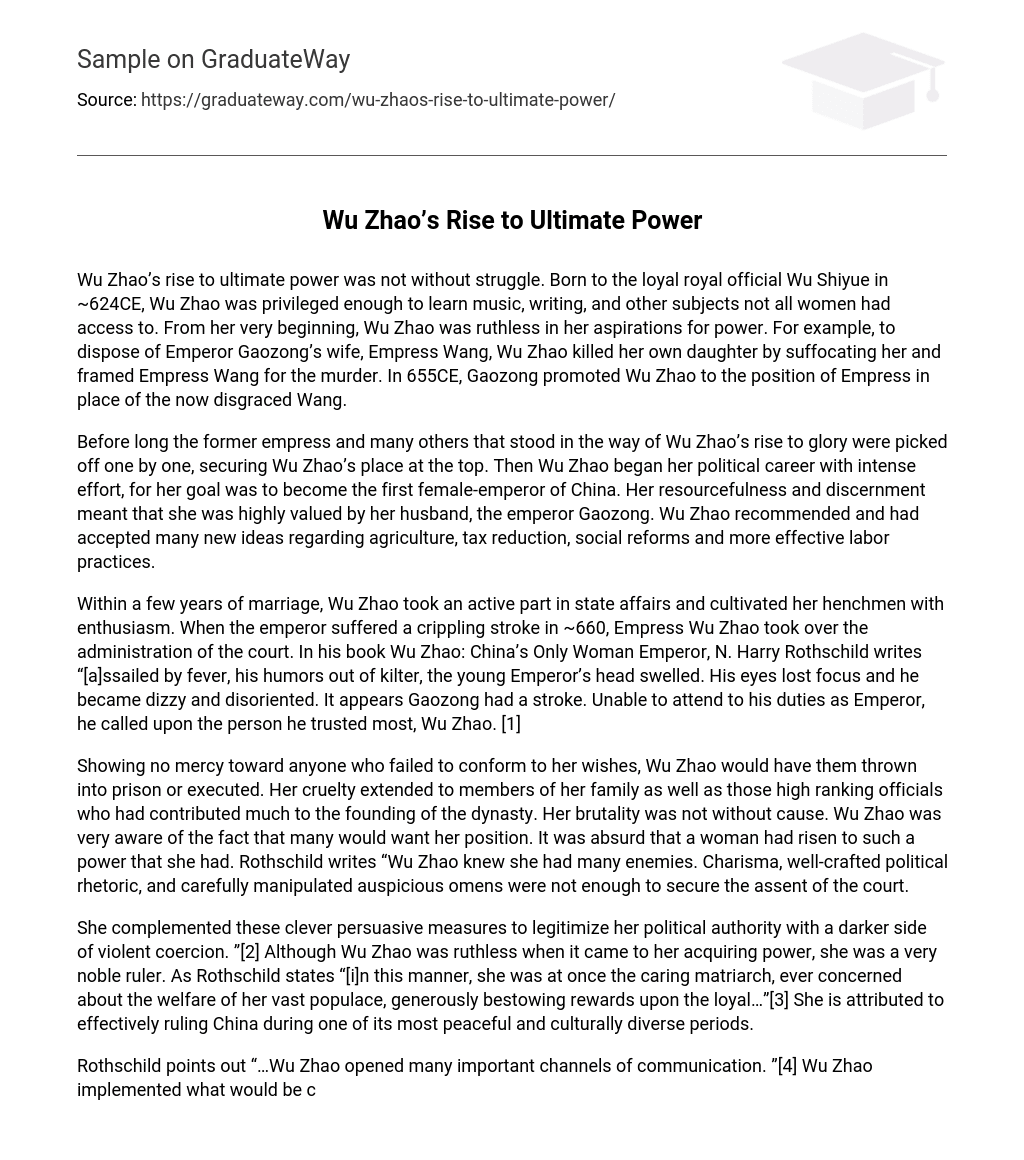Wu Zhao’s rise to ultimate power was not without struggle. Born to the loyal royal official Wu Shiyue in ~624CE, Wu Zhao was privileged enough to learn music, writing, and other subjects not all women had access to. From her very beginning, Wu Zhao was ruthless in her aspirations for power. For example, to dispose of Emperor Gaozong’s wife, Empress Wang, Wu Zhao killed her own daughter by suffocating her and framed Empress Wang for the murder. In 655CE, Gaozong promoted Wu Zhao to the position of Empress in place of the now disgraced Wang.
Before long the former empress and many others that stood in the way of Wu Zhao’s rise to glory were picked off one by one, securing Wu Zhao’s place at the top. Then Wu Zhao began her political career with intense effort, for her goal was to become the first female-emperor of China. Her resourcefulness and discernment meant that she was highly valued by her husband, the emperor Gaozong. Wu Zhao recommended and had accepted many new ideas regarding agriculture, tax reduction, social reforms and more effective labor practices.
Within a few years of marriage, Wu Zhao took an active part in state affairs and cultivated her henchmen with enthusiasm. When the emperor suffered a crippling stroke in ~660, Empress Wu Zhao took over the administration of the court. In his book Wu Zhao: China’s Only Woman Emperor, N. Harry Rothschild writes “[a]ssailed by fever, his humors out of kilter, the young Emperor’s head swelled. His eyes lost focus and he became dizzy and disoriented. It appears Gaozong had a stroke. Unable to attend to his duties as Emperor, he called upon the person he trusted most, Wu Zhao. [1]
Showing no mercy toward anyone who failed to conform to her wishes, Wu Zhao would have them thrown into prison or executed. Her cruelty extended to members of her family as well as those high ranking officials who had contributed much to the founding of the dynasty. Her brutality was not without cause. Wu Zhao was very aware of the fact that many would want her position. It was absurd that a woman had risen to such a power that she had. Rothschild writes “Wu Zhao knew she had many enemies. Charisma, well-crafted political rhetoric, and carefully manipulated auspicious omens were not enough to secure the assent of the court.
She complemented these clever persuasive measures to legitimize her political authority with a darker side of violent coercion. ”[2] Although Wu Zhao was ruthless when it came to her acquiring power, she was a very noble ruler. As Rothschild states “[i]n this manner, she was at once the caring matriarch, ever concerned about the welfare of her vast populace, generously bestowing rewards upon the loyal…”[3] She is attributed to effectively ruling China during one of its most peaceful and culturally diverse periods.
Rothschild points out “…Wu Zhao opened many important channels of communication. ”[4] Wu Zhao implemented what would be considered today as a suggestion box. Rothschild writes “[t]he following year, she ordered the casting of a unique box, another device she hoped would improve the communication between the people and the government, enabling her to keep her finger on the pulse of the empire. ”[5] The Tang Dynasty is largely attributed to a time of peace, stability and progress.
The role of women during the Tang dynasty was very open and liberal in comparison to the rules of previous dynasties. Women during this period did not generally bind their feet, which was a popular practice in Chinese culture and they popularized many lyrical poems written by men. Wu Zhao broke the mould for all women living during Tang Dynasty. She was the epitome of what was considered desirable during this time, strong and assertive.
However, she also exceeded those character expectations and rose above many powerful men to attain her status and power. Although she was ruthless in seeking out her power, Wu Zhao was a very great leader and was able to further propel the glory of the Tang Dynasty with her methods of rule. To some she was an autocrat, ruthless in her desire to gain and keep power. To others she, as a woman doing a “man’s job” just as well, or even perhaps better than the men that preceded and followed her.





